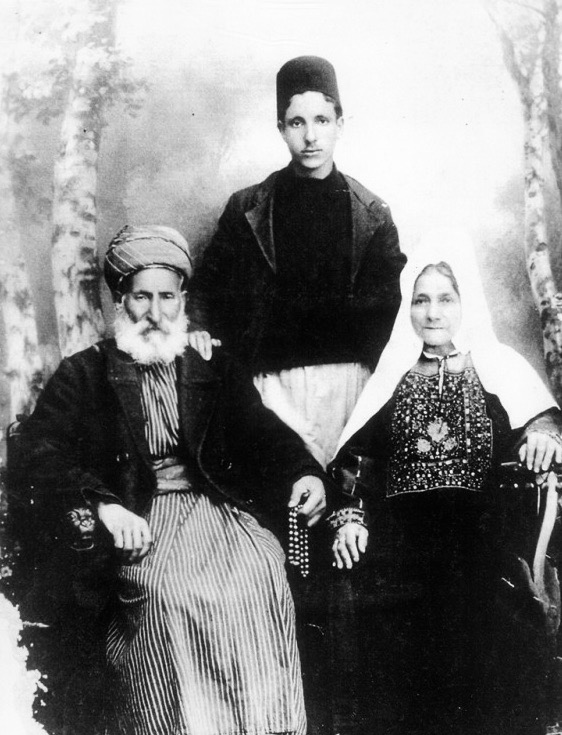Bezalel Smotrich, Israel’s finance minister, is an embarrassment to himself and the nation he serves. He is, unfortunately, one of the new faces of Israel.
Only two weeks after wantonly advocating the destruction of the Palestinian West Bank town of Huwara, where Jewish settlers ran amok late last month after the murder of two Israeli brothers who were passing through it, Smotrich ignited a storm with a troubling speech he delivered to supporters in Paris.
“There is no such thing as Palestinians because there is no such thing as a Palestinian people,” he declared in no uncertain terms, standing near a map of greater Israel encompassing its Arab neighbor, Jordan.
Smotrich, whose Religious Zionism Party enabled Prime Minister Benjamin Netanyahu to form his sixth government late last year, told a sympathetic audience that he himself is a “Palestinian” by virtue of his ancestry.

His grandmother was born in Metulla, a town in the Galilee, a century ago. And his grandfather was a 13th-generation resident of Jerusalem. They were the “real Palestinians,” as opposed to the millions of Palestinians who live in the West Bank and the Gaza Strip.
Adding insult to injury, Smotrich claimed that Palestinian culture and history do not exist.
“Is there a Palestinian history or culture?” he asked rhetorically. “No. There were Arabs in the Middle East who arrived in the land of Israel at the same time as the Jewish immigration and the beginning of Zionism.”
He added, “After 2,000 years of exile, the people of Israel were returning home, and there were Arabs around (us) who do not like it. So what do they do? They invent a fictitious people in the land of Israel and claim fictitious rights in the land of Israel just to fight the Zionist movement.”
Smotrich’s patently false narrative neatly dovetails with the skewed beliefs of Israelis like himself who vehemently reject the notion of Palestinian peoplehood and statehood.

The high-handed, arrogant manner in which he denigrated the Palestinians sounded very familiar. In 1969, the then Israeli prime minister, Golda Meir, said, “There is no such thing as Palestinians.” She made that absurd claim in an interview with a British journalist. Though she clarified her remark some years later, it was still mired in the realm of fantasy. As she illogically put it, “There is no Palestinian people. There are Palestinian refugees.”
It may well be that Smotrich was influenced not only by Meir, but by the author Joan Peters. In 1984, Peters’ controversial book, From Time Immemorial: The Origins of the Arab-Jewish Conflict Over Palestine, was published to mixed reviews.
While right-wing supporters of Israel praised it as a rigorous work of scholarship refuting Palestinian claims and accusations against Israel, still others denounced it as an inaccurate rewrite of history, a clever polemic containing an element of truth and ignoring inconvenient facts.
Peters, an American journalist who died in 2015, blasted the notion of a historical Palestinian homeland in Palestine as an invention. In her view, Palestine was a mostly barren, under-populated land prior to the 20th century.

By her reckoning, Arabs from around the Middle East were drawn to Palestine in the late 1800s by the prospect of jobs, which were created by the enterprise of the newly formed Zionist movement. Many Palestinians today are the descendants of these Arab economic immigrants, she noted.
Peters’ theory reinforced the incredulous claim by myopic Zionists that Palestine had been “a land without a people for a people without a land.”
By the time the first wave of Jewish immigrants arrived in the 1880s, in response to a wave of pogroms in the Russian empire, Palestine was primarily populated by Muslim and Christian Palestinians in a network of towns of villages mainly along the coastal plain, the Galilee and what is now the West Bank and Gaza.

They had developed a keen sense of Palestinian national consciousness and a distinct Palestinian culture and cuisine, though their quest for statehood was admittedly sharpened by the arrival of Jews in Palestine, a province of southern Syria during the 400-year Ottoman era.
Smotrich is either unaware of these facts, or willfully chooses to ignore them for his own expedient reasons. Proceeding from his twisted assumptions about the Palestinians, he belittles the concept of Palestinian nationalism and decries the very idea of Palestinian statehood, while laying a claim to the borders of the ancient land of Israel, which once included contemporary Jordan.
Extreme Zionists like Smotrich often do not distinguish between Israel and Jordan and erroneously conflate them. Still others argue that a Palestinian state should be located in Jordan, at the expense of its ruling elite. Which is probably why Smotrich delivered his speech in Paris behind a map of the Middle East without Jordan.
So in one fell swoop, he not only offended the Palestinians, but angered the Jordanian government as well.
In an indignant statement, Jordan’s Foreign Ministry lambasted Smotrich’s appearance in France as “reckless incitement and a violation of international norms and the Jordanian peace treaty.” The Jordanians complained that Smotrich’s conduct was a threat to “security and stability.”
Jordan also summoned Israel’s ambassador in Amman, Eitan Surkis, for a diplomatic reprimand.
Concerned by Jordan’s reaction, the Foreign Ministry in Jerusalem released a communique stating Israel’s commitment to its 1994 peace treaty with Jordan, while Netanyahu’s national security advisor, Tzachi Hanegbi, phoned Jordanian Foreign Minister Ayman Safadi with a similar assurance.

Significantly, neither the Foreign Ministry nor Hangebi mentioned Smotrich’s ill-conceived remarks about the Palestinians, tacitly proving two overlapping points. Netanyahu’s far right-wing government will dangerously let the Palestinian problem fester and will do everything in its power to thwart Palestinian statehood.
This, of course, is a prescription for further chaos, violence and bloodshed.
